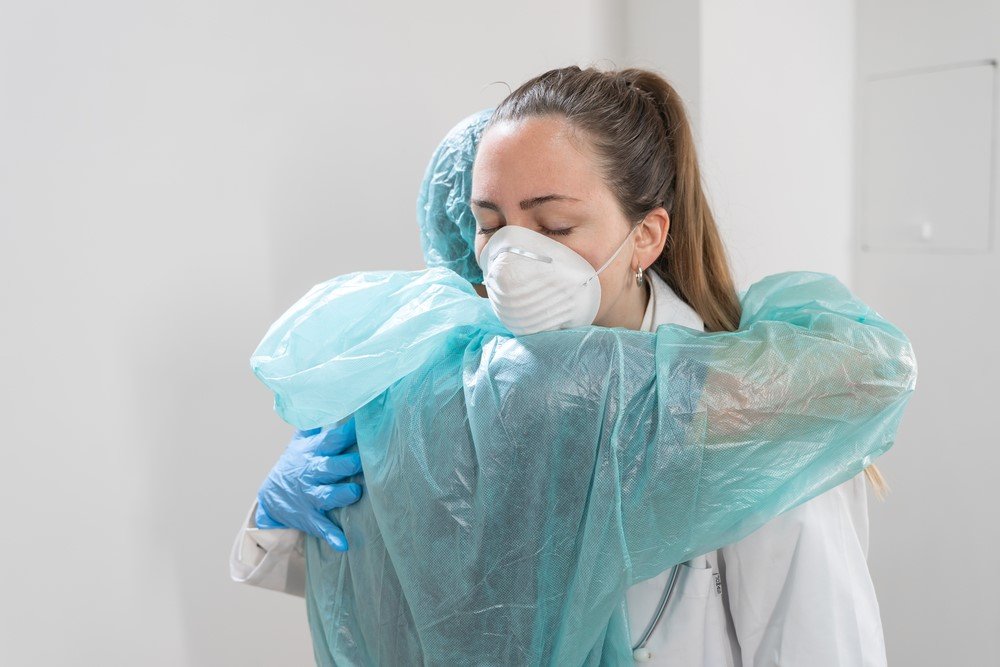There’s no doubt in anyone’s mind that the COVID-19 pandemic has wreaked havoc on the American psyche — and perhaps no one has gotten it worse than healthcare professionals, who have stood at the frontlines of each wave of the pandemic.
As healthcare institutions struggle under the stress and strain of the pandemic’s past, present and future, healthcare workers are facing their own epidemic: extreme mental health concerns that may take years to recover from once we collectively leave the acute phase of the pandemic.

Source: eldar nukovic/Shutterstock.com
Self-care is one important step towards caring for your mental health as a medical provider — think buying healthcare worker-oriented products like a hydrating face cream or a lip serum — but there are many reasons why you should keep your mental health at the front of your mind as we move through and beyond the COVID-19 pandemic and into the ever-shifting “new normal.”
Shocking Statistics
According to a study from Mental Health America about the way COVID-19 has affected healthcare workers, an overwhelming majority of people in the medical industry have had their mental health negatively affected by the pandemic.

Source: Pixel Shot/Shutterstock.com
A whopping 92 percent of healthcare professionals polled said they’ve experienced stress, with 86 percent saying they felt anxious, 77 percent saying they were frustrated and 76 percent saying they felt exhausted or burnt out. Compare those numbers to those who said they’d felt positively in recent months — only 27 percent said they felt hopeful and only 31 percent said they felt grateful.
These numbers are even more shocking when additional work-related context was added. Nearly 63 percent of respondents said they felt “work-related dread,” 55 percent said they were questioning their career path and 52 percent said they were experiencing “compassion fatigue,” or difficulty feeling compassionate towards their patients.
Many of the surveyed healthcare workers manifested physical and mental health symptoms as well: 70 percent said they were having trouble sleeping, 56 percent said they had a change in appetite and 55 percent said they experienced stomachaches and/or headaches.
While these statistics can seem shocking, they’re a telling portrait of just how hard-hit the medical industry has been during the pandemic. The only way to handle these difficult issues moving forward is to address them directly because, regardless of the duration of COVID-19’s acute phase, healthcare workers need more mental health support to handle their increasingly trying jobs.
Addressing Mental Health Concerns

Source: Deliris/Shutterstock.com
It’s clear that in order to continue doing their jobs to the best of their ability, healthcare workers must take extra care of their mental health to survive through the rest of the pandemic and beyond with their health and well-being intact.
While COVID-19 has undoubtedly left its mark on the lives of healthcare professionals around the country and the globe, there’s more focus than ever before on the mental health of medical workers — which means there’s more compassion and more resources to address any concerns that you may have.
In March, the Joint Commission, an important institution that accredits healthcare organizations and programs across the world, issued a report on the mental health crisis among healthcare workers. This report represents a sea of change in the medical industry where, all too often, the mental health of its workers fell by the wayside.
In its report, the Joint Commission urged healthcare institutions to foster more open dialogue about difficult topics among staffers and between staff and supervisors. The Commission also suggested that hospitals and doctors’ offices should offer mental health resources and more flexible scheduling to promote work-life balance and a focus on mental health and well-being.
Each workplace is unique, and this is doubly true in the medical field. Speaking with your supervisors about mental health resources — be it therapy dogs, more open office hours with HR, in-house mental health services or seminars on mental wellness — is a great way to advocate not only for your own mental health, but also for that of your coworkers as well.
Similarly, if you have a frontline healthcare worker in your family or among your friends, frontline worker cards can be a great way of showing your support and encouraging them during these difficult times.
Additional Resources
While your workplace can and should advocate for better mental health resources for your team, it’s ultimately up to you to ask for help when you need it — which is often the hardest part of dealing with mental health issues in the first place.
Firstly, remember that you are not alone. There are tons of articles and studies outlining exactly how difficult the pandemic has been for people in the medical industry, which means that the world is paying attention.
Getting mental health help doesn’t just have to look like finding a therapist or psychiatrist. Speaking with friends, family members or a trusted coworker or supervisor is an easy way to address your concerns. If you don’t feel comfortable doing that, you can always call a helpline, such as Therapy Aid or The Emotional PPE Project. Many of these free and confidential services specifically cater to frontline workers.

